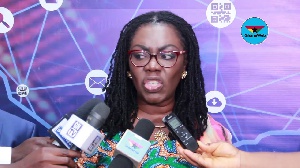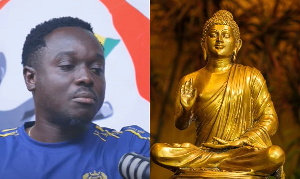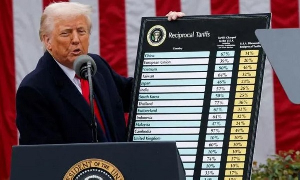Hopes of Ghana Independent Broadcasters Association to have their concerns regarding the Government’s deal with Chinese owned StarTimes has been dashed after sector Minister, Ursula Owusu-Ekuful downplayed their inputs saying GIBA has no right to dictate to the government what to do.
Describing their concerns as alarmist, Ursula Owusu-Ekuful emphasised her unwillingness to engage GIBA articulating that the government was elected with a mandate and that doesn’t include kowtowing to the demands of GIBA.
In her response to submissions from a rep of GIBA and Sam George, NDC MP for Ningo-Prampram and member of Parliament’s Communications Committee the Communications Minister suggested she was confused about the position espoused by them.
She noted that GIBA and other stakeholders who have raised issues with the deal have failed to clearly point out what their real concerns are, leaving her with doubts as to what really the issues are.
She stressed that GIBA, irrespective of whatever their position on the matter is, cannot compel government to take certain actions simply because they(GIBA) have said so.
She asserted that since the government is financing the project and not GIBA, they have no right whatsoever to dictate to government what it should do or what processes to follow in engaging Chinese company StarTimes.
Government through the Communications Ministry engaged Chinese company StarTimes to expand infrastructure for digital terrestrial television.
This is the second time StarTimes is doing business with the Government of Ghana on the same project after the initial contract signed in 2012 worth $95m was cancelled in 2015 and given to Ghanaian owned K-Net who successfully executed the project for about $13 million less the StarTimes amount at $82 million.
GIBA accused government of ceding the country’s DTT platform to StarTimes through the Ministry of Communications as contained in a press release stating “If StarTimes is allowed to control both Ghana’s only digital television infrastructure and the satellite space in the name of digital migration, Ghana would have virtually submitted its broadcast space to Chinese control and content.”
Speaking on JoyNews’ flagship Saturday morning news analysis show Newsfile, the Communications Minister remarked, “Is the independent Broadcasters Association telling us that they should dictate the pace, content of the DTT migration project? I don’t think so and I think that they also see themselves as key stakeholders of the project but not as dictators of the entire project because they are not financing the project and they can’t sit there and dictate what government does in this process. And I will be a little hesitant to think that that is the stance they have taken that because they have said ‘A’, it should be ‘A’ and it shouldn’t be any other process.”
“I have sat here and listened to these two gentlemen and I am still at a loss what their issues are. Is it a question of not getting timely response to the correspondence that has been sent to the Ministry? or is it as has been put out there in that alarmist publication by GIBA that the Ministry of Communications is handing over the DTT infrastructure to a Chinese company StarTimes to manage? What is the issue? When you put it to GIBA they were unable to allege that what they put out there in their press statement is what is the issue. Now it is lack of timely response in questions sent to the Ministry so I am still trying to find out exactly what GIBA’s concerns are so that we can address them” the sector Minister observed.
Wading into the debate, Ningo Prampram MP Sam George hinted that Ghana is at risk of flooding its media landscape with a lot of Chinese content and production as has been the case in several African countries recently.
He expressed doubts over some clauses in the contract insisting the deal is not in the best interest of the country and has the potential to kick out of business, private Ghanaian-owned media establishments.
Sam George expressed his disappointment in government’s decision to ditch a local firm that built the infrastructure without providing any substantial basis for their actions asserting that the tax waivers granted the Chinese company could have been extended to some local firms to help them flourish.
The member of the Communications Committee of parliament argued, “In Burundi post-2015, during the launch of one of the projects Mr Chong Yin Xing, Chief Manager of Burundi branch of StarTimes remarked that the beneficiaries of the project will watch channels like Kungfu channel, Samson Kungfu Channel, watch Chinese news, so that they can have a direct knowledge of China. Samson anybody who have done marketing 1-O-1 will know that what StarTimes is doing is building market penetration. They are going into the most deprived areas where they may not have DTT access as we sit now because we have not rolled out full DTT access but they are trying to capture that market”
“Now our government is financing a Chinese enterprise’s business market penetration when Samson Multimedia and all the work Kwesi Twum has done in our media landscape they have not enjoyed GHC1 in waivers. K-NET has built one of the biggest platforms, the DTH platform, they have not enjoyed anything, Dr Paa Kwesi Nduom has built First Digital he has not enjoyed anything, Chief Crystal Dzirakor of Crystal TV has not enjoyed anything. These are indigenous Ghanaian business that has not enjoyed GHC1” he submitted.













